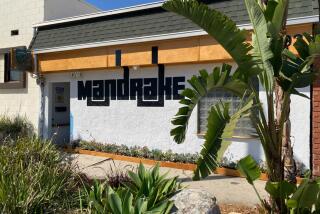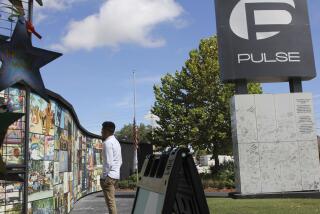Partners’ Lawsuit Padlocks Famed Texas Honky-Tonk : It’s Finally Closin’ Time at Gilley’s
- Share via
PASADENA, Tex. — Gilley’s is a goner.
Once it was the most famous of honky-tonks, a vast 70,000-square-foot beer joint on a gone-to-seed street lined with used car lots and pawnshops. John Travolta made the mechanical bulls here all the rage after he rode them in the movie “Urban Cowboy.”
But the nightclub--self-described as the “biggest, brawlingest, dancingest, craziest honky-tonk in Texas”--was locked shut Friday morning, the day after a court-appointed receiver ordered it closed.
The closure has apparently put a definite end to the joint that had its own shooting gallery and shower for truckers and rodeo arena and pool tables and punching bags and a dance floor big enough to accommodate the thousands who once poured in from everywhere.
And how does Mickey Gilley feel about it all? He’s just glad it’s over.
‘Bittersweet Thing’
“It’s a bittersweet thing, but it happened,” said the country-and-Western singer. What happened actually was that there was a legal tussle with his one-time partner, in which Gilley fought to have his name removed from the club, and to receive the payment of millions of dollars owed him. Gilley won the suit, and the closing of the club is a direct result.
“I think the courts did Pasadena and country music a favor,” said Gilley, who may end up owning the property outright in a settlement with his former partner, Sherwood Cryer. “The first thing I’ll do is put it up for sale.”
Gilley’s version of the story, which the courts believed, was that the honky-tonk was deteriorating because Cryer refused to make major renovations over the years. Gilley started hearing complaints from angry fans when he was on the road--that they had been ripped off, that things cost too much, that the restrooms were filthy and the parking lot needed paving. But when he confronted Cryer, his partner refused to make any changes.
“I said: ‘You’re not hurting yourself, you’re hurting Mickey Gilley,’ ” recalled the singer.
Bad to Worse
As time went on, things went from bad to worse in the relationship between the two men, who had been partners since 1971. Then came the lawsuit last April and the awarding of $17 million to Gilley last summer. Still, the club continued to operate as Gilley’s until the court-appointed receiver, Mike Wood, ordered it closed. He said Gilley’s continued to lose money and that it was time to cut the club’s losses.
On Friday morning, Gilley’s had an almost eerie feeling to it--vast and dark and empty, with blinking video games in one corner of the dance hall. The sign on the door summed up what had happened: “These premises have been secured by the 269th District Court in Harris County.”
Close-by was another sign: “We may doze but we never close.”
Inside, six-packs of Gilley’s Beer were stacked on the bar, while display cases sported Gilley’s T-shirts and Gilley’s panties and Gilley’s this and Gilley’s that. At the bandstand, drummer Terry Westbrook was packing up his equipment. His band, the Bayou City Beat, had been performing here for 11 years.
“It’s pretty strange,” he said. “We felt it was coming but we didn’t know for sure.”
Gene Burns, the club manager, sat on cases of beer drinking a soda. He had started nine years ago as a bartender’s assistant--carting in ice, picking things up, washing glasses. In his mind, it was Cryer who was being maligned and Gilley who was wrong. To him, Gilley had gotten too uppity for his own good.
“This is the club that made him, the town that made him,” he said. “Other places catered to him because he was a star, but here he was just a homeboy. He bit the hand that fed him. The entertainer didn’t make the club, the manager made the entertainer.”
Burns made his way over to the mechanical bulls. There were three now. There had been five when riding them was the ultimate urban cowboy experience. A sign over one of the bars, “Welcome Rodeo Fans,” has been there as long as Burns can remember.
He talked of how business had been better of late, now that Pasadena and adjacent Houston were emerging from the dark days of the oil bust. He said as many as 3,500 people were coming on the weekends. But that had not been enough.
More to Read
Sign up for Essential California
The most important California stories and recommendations in your inbox every morning.
You may occasionally receive promotional content from the Los Angeles Times.













